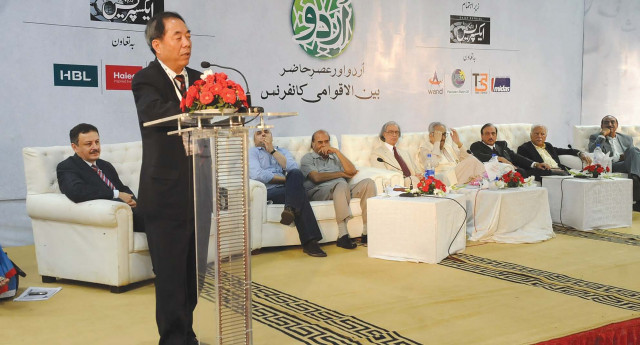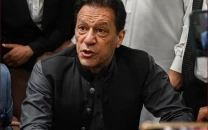Express effort: Lament for vanishing Urdu made at international conference
Experts discuss the language used in the electronic media.

In the first session, intellectual Jamil-ud Din Aali wondered why, despite the long struggle of the Anjuman-e Tarraqi Urdu that the government did not use Urdu as the national language in its institutions. “It is encouraging to see, however, that some national institutions have started receiving applications written in Urdu,” he remarked, only to wryly add, “but they still prefer to reply in English.”
Aali was not against English, he stressed. It is an international language with a rich literature. “But we cannot also see Urdu as a secondary language of the country,” he explained.
The conference brought together experts from across the globe, including India, Turkey, China, Canada, the United Arab Emirates and even Norway.
In his lecture, India’s Zubair Rizvi discussed the growth of Urdu in countries of the Middle East, United States and Canada and some in Europe. “Migration for employment was the fundamental cause of the spread of Urdu in many countries,” he said. “The Mushaira culture played a pivotal role in the promotion of Urdu abroad.”
And did you know that before its decline, the USSR, in association with India, was an eminent promoter of Urdu. Russian books were translated into Urdu on a vast scale. The same cannot be perhaps said of Pakistan and China. “However, once, at a conference in Islamabad, I witnessed a 22-member delegation from China speaking Urdu very fluently,” he recalled.
Turkish delegate Prof. Khalil Tauq Err said that the first era of Urdu in Turkey ended with the Second World War but the second era began in 1956 when the University of Ankara started teaching it. Later on, the University of Konia Saljouq founded a department of Urdu in 1985.
Raza Ali Abidi from the UK spoke of Urdu-speaking immigrants arriving in search of employment but unwittingly spreading their language which he wagered was the second most spoken language in the UK. In fact, now you will find British government banners and posters in Urdu.
“Queen Victoria knew how to read, write and speak in Urdu and she even published a booklet, which she distributed among all the attendants in her palace,” he claimed. It is a shame though that now, immigrants, who used to hold Urdu sessions every Sunday for their children, did this no more.
Kabeer Khan from the United Arab Emirates spoke of how Arabic was the official language but Urdu was a medium of communication among the natives and non-natives. Urdu is part of a large number of homes in the UAE because the native Arab males have married Urdu-speaking Indian women and have Urdu-speaking attendants from India. Indian Hindi/Urdu films and Pakistani drama play in almost every home, he added.
Electronic media
In the second session on Urdu in the media, Ahfaz Ur Rehman referred to the language’s “extreme elasticity” because it readily absorbs foreign words and phrases. People use the Roman script for Urdu text to communicate over social media. However, he lamented, Urdu literature-based programmes are limited because the corporate sector does not back them with commercials.
Others spoke of the distortion of Urdu in the media where anchors make grammatical mistakes. “They should have self accountability to judge their ability and if found guilty of distortion, they should improve their language,” he said.
Zubair Rizvi took a different angle. He said that today, the circle of Urdu in India may have narrowed but the media has played an impressive role, especially Indian TV channels.
The third session was about the relationship of Urdu with regional languages of Pakistan. Six scholars were invited to shed light on it, including Dr Saleem Akhter, who headed the session. Saleem Raaz spoke on the relationship between Urdu and Pashto, Bushra Ijaz for Punjabi, Noor Khan Mohammed Hasni for Brohi, Mohtarma Murhab Qasmi for Sindhi and Najeeb Jamal for Seraiki.
The conference continues today and will end with a mushaira.
Published in The Express Tribune, October 1st, 2011.



















COMMENTS
Comments are moderated and generally will be posted if they are on-topic and not abusive.
For more information, please see our Comments FAQ